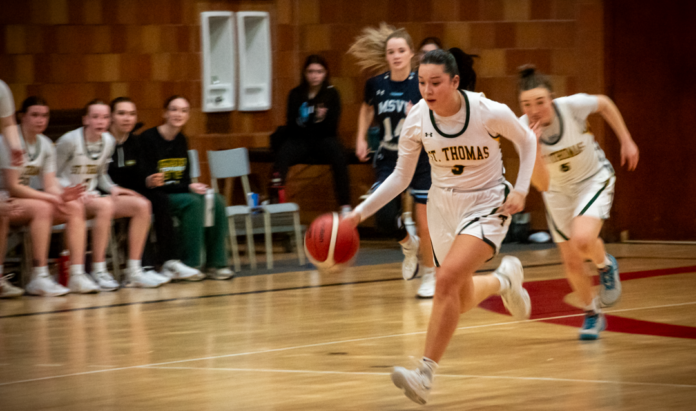

In a bid to break down the barriers surrounding mental health in sports, St. Thomas University’s Athletics Department organized Bell Let’s Talk Games across its volleyball, basketball and hockey teams.
The initiative, part of the university’s ongoing collaboration with the Bell Let’s Talk campaign, aimed to raise awareness about mental health issues and challenge the stigma associated with athletes seeking support.
Athletic Director Meaghan Donahue Wies shed light on the university’s commitment to the cause.
“Historically, every year … we use this opportunity to promote the message and the importance of mental health awareness, especially in the context of sports,” she said.
Teams actively participated by incorporating the campaign’s branding and engaging in conversations around mental health awareness. The initiative included social media campaigns, videos and gameday scripts aimed at educating both players and spectators.
“The stigma is not nearly what it used to be. A decade ago, the prevailing narrative was that athletes had to be stoic and invulnerable,” said Donahue Wies. “Now, we see a positive shift in comfort levels, with athletes openly discussing mental health challenges and seeking support.”
She acknowledged the unique pressures faced by performance-level athletes, emphasizing the importance of balance.
“Striking the right balance is crucial and we are committed to ensuring resources are in place to support our athletes.”
The STU Athletics Department collaborates with university-wide mental health resources and Donahue Wies has already initiated conversations with campus mental health coordinators to explore tailored resources for the student-athlete population.
“Our student-athletes are students first,” she said. “We strive to create an environment that is comfortable but challenging, but recognizing that there is so much more to life than a sport.”
Looking ahead, the department plans to implement initiatives such as athlete-student alumni programs, mentorship programs and time management workshops. Donahue Wies also highlighted the importance of aligning future coaching hires with the department’s commitment to student-athlete wellness.
“We’re here to support,” said Donahue Wies. “There’s nothing wrong with looking for help, even proactively.”
“We encourage open conversations about mental health and we hope that student-athletes understand they are valued as individuals beyond their athletic achievements.”
The Bell Let’s Talk Games at STU are a testament to the ongoing efforts to create a supportive and inclusive environment where mental health is prioritized alongside athletic success.
Kathleen Quinlan, a second-year psychology major and a member of the women’s basketball team, acknowledged the existing stigma surrounding mental health in athletes.
“There’s definitely a stigma around mental health and athletes because they don’t want to be seen as weak,” said Quinlan. “They think that mental health and speaking up would be taken as a sign of weakness, which isn’t the case at all.”
Quinlan praised the efforts of the athletics department, particularly mentioning the introduction of a mental trainer for her basketball team.
“She makes it known that rehabbing an injury is the same as speaking up and getting help with your mental health struggles, it’s just as important.”
The sense of community within the athletics department and the broader university was a key aspect Quinlan highlighted.
“They just make sure that you feel like you’re part of a family,” she said.
Basketball is where Quinlan finds comfort and she said it helps to get her mind off other issues.
“When I go into the gym, my focus is on basketball,” she said. “It’s something I look forward to and I really enjoy.”
Quinlan encouraged all athletes struggling silently to not be afraid to reach out for help.
“I know everybody on my team would be willing to listen and I think I can speak for the entire community at STU,” she said. “If you find anybody, they would be willing to listen and can get you the right resources.”
Related: Commentary: A player’s struggle being mentally stuck
